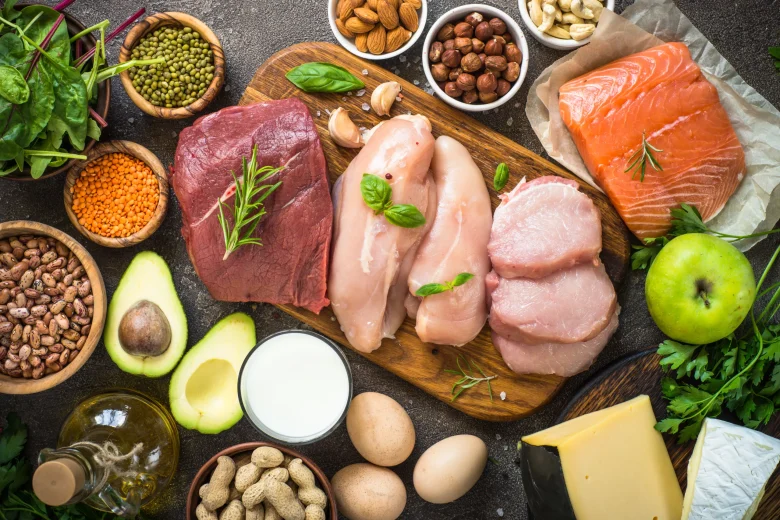Protein is an integral macronutrient for all athletes. It supplies amino acids, which are used to build and repair muscle tissue as well as assist in heat adaptation and water balance. Athletes require balanced daily protein intakes consisting of both whole food sources and leucine-enriched supplements in order to maximise muscular protein remodelling and recovery. This approach will be most beneficial.
1. Post-Workout Recovery
After an intensive workout, muscles need time and nutrients to repair themselves and rebuild themselves. Consuming protein during this post-workout window is critical, along with cooling down and stretching to reduce muscle soreness and increase flexibility.
Athletes must consume between 1.3 to 1.7 grams of protein per kilogram of body weight per day—that equates to between 88 to 116 grams for someone weighing 150 pounds. Protein can be found in various foods like meat, fish, eggs, dairy, soy products, and milk products. Studies suggest that proteins high in leucine promote an enhanced anabolic response compared to lower-leucine sources, making consuming supplements with leucine beneficial post-exercise.
2. Post-Training Nutrition
Athletes must eat enough protein to promote muscle protein synthesis and aid recovery, maintain muscle mass, and support performance gains over time.
Nutritious whole foods should be prioritised over supplemented protein sources with leucine for maximum anabolism in the immediate post-exercise period (such as shakes or bars). Unfortunately, research does not support taking more than 2-3 g per kilogram of body weight of protein, as this could increase risks associated with kidney disease. Consuming 15-25 g of protein within an hour after resistance exercise is an ideal guideline for most athletes, particularly when on energy-restricted diets that promote muscle maintenance.
3. Endurance Training
Similar to gym rats who need an abundance of protein for mass gain, endurance athletes tend to be less concerned with amassing muscle. But their protein needs remain elevated because repeated impact damages their bodies’ muscles, necessitating additional amino acids to heal.
Studies have demonstrated that endurance athletes need a certain amount of protein before using excess amino acids as fuel instead of muscle building. Therefore, endurance athletes are generally advised to consume between 0.8 and 1 grams per kilogram of body weight per day (which would translate to your weight in pounds divided by 2.2). Dietitians can assist with calculating your individual protein needs based on your circumstances and exercise load.
4. Strength Training
Protein is an essential nutrient, helping build muscles and enhance performance. For optimal results, the ideal source would be whole food rather than shakes or supplements.
Master athletes train at higher volumes and intensities than their non-athlete peers, thus necessitating more protein than is typical for an average person. Unfortunately, research to date does not support megadoses of protein consumption—anything more than 2-3 g per kilogram of body weight daily may accelerate existing kidney conditions in some people. To maximise muscle growth, try mixing up your training regimen with plyometric exercises such as lunge jumps and plank jacks—these plyometric moves will help develop power while building muscle mass.
5. Weight Training
Protein is essential when training to increase muscle mass. Athletes can meet their protein needs by eating whole foods and taking leucine-enriched supplemental proteins, according to Ludlow.
Researchers have discovered that eating a protein-rich meal post-exercise increases muscle protein synthesis, helping an athlete build more muscle mass over time. They’ve found that exceeding 2-3 grams per kilogram of body weight doesn’t provide any additional performance-boosting benefits beyond this point. Master athletes should consult a registered dietitian to ascertain their protein needs, which can be found via searching through the Academy of Nutrition and Dietetics’ searchable database.
6. Muscle Mass Maintenance
Researchers have reported that athletes who train regularly require 12-15 percent of their daily caloric intake as protein. This can easily be accomplished with a well-rounded diet featuring animal proteins as well as plant proteins found in beans, legumes, nuts, and seitan [5,6]. Sample meals designed specifically for NFL players also prioritise protein [5, 6].
Athletes training to maintain muscle mass should consume 1.3 to 1.7 grams of protein per kilogram of body weight daily (0.7-0.8 grams per pound). Aim to spread out this consumption over four or six small meals during the day for maximum muscle protein synthesis; sources include poultry, fish, eggs, milk, cheese, and even protein powder! The ideal sources are poultry, fish, eggs, milk, and cheese with some form of added protein powder added at each meal time.
7. Weight Loss
Protein can either be seen as the key nutrient for runners or an indulgence that puts our health at risk; truth lies somewhere in between. Ideal, athletes should obtain their protein through whole food sources rather than powders or shakes, to maximize muscle repair and growth and receive various vitamins and minerals as they repair tissues in the body.
Studies conducted previously demonstrated that American football players’ diets typically meet protein needs up to 1.6 g per kg of body weight per day; any additional intake does not contribute to resistance-training-induced increases in muscle mass and strength gains.
8. Recovery
Even though protein plays an essential part in muscle building and repair, there is no conclusive evidence that increasing protein consumption directly improves resistance or endurance exercise performance. Instead, its benefits stem from increasing muscle mass and improving metabolic function.
Protein provides your body with essential amino acids for healing and building new muscles, as well as providing fuel during extended exercise—but carbohydrates tend to be preferred over protein in this regard, making it essential to find an optimum combination of both in order to optimise performance. Studies indicate that protein intakes between 1.3-1.8 grams per kg bodyweight a day taken as three or four isonitrogenous meals can promote muscle protein synthesis. If considering higher intakes, consult an accredited sports dietitian.




